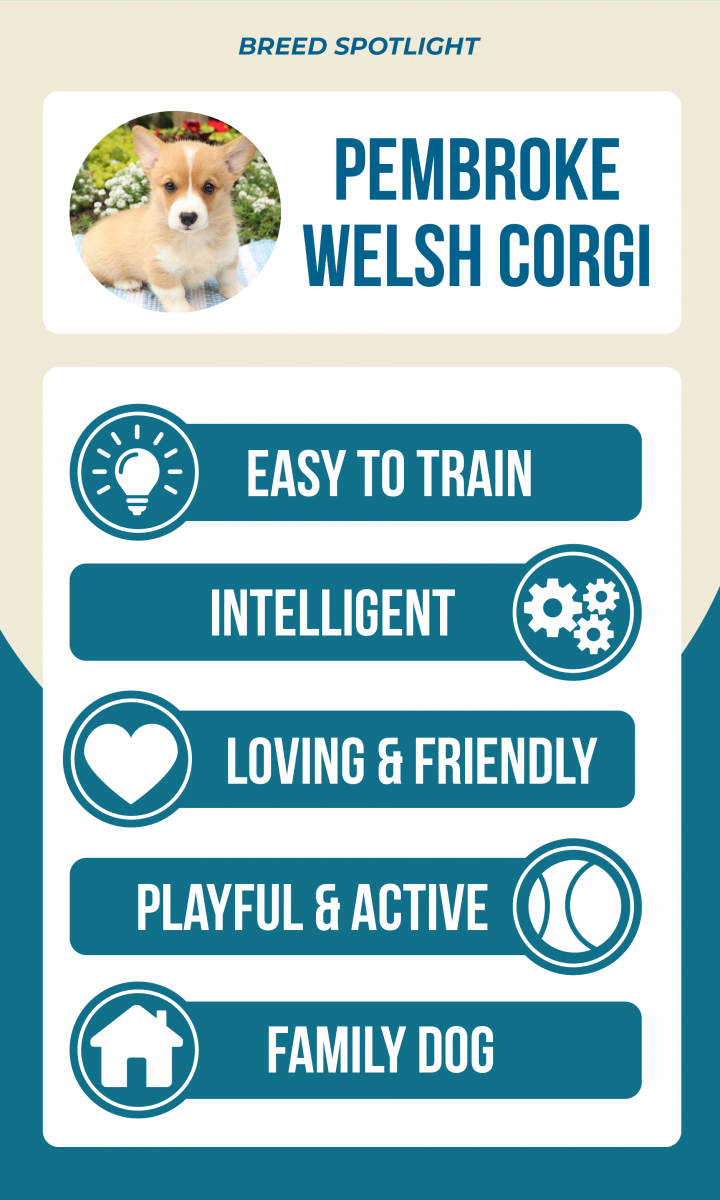Pembroke Welsh Corgis have quickly become one of the most sought-after breeds in America. Most potential owners are originally drawn to the breed because of their cuteness, but this affectionate and agreeable breed has a lot to offer beyond its looks.
History of the Corgi
You can trace the Corgi’s lineage back to as early as 1107 when Flemish weavers brought their herding dogs with them as they traveled to Wales. Henry I invited these weavers to Britain to live in Wales, and they brought the dogs they used to herd cattle and sheep. These dogs are the foundation of the Corgi breed and its evolution since. The Pembroke Welsh Corgi became a separate breed from its cousin the Cardigan Welsh Corgi in the late 1800s and gained immense popularity when Queen Elizabeth II got one in 1933. She hasn’t been without a Pembroke Welsh Corgi since, which has played a large role in the breed’s popularity to this day.
Corgi Characteristics
Appearance and Coat
Corgis are a big dog in a small package. At 10”-12” at the shoulder and 27-30 lbs Corgis are built long, low, and sturdy. Their short and powerful legs allow them to be quick and agile despite their size, and equipped them for a hard day's work of herding in their past.
They have a soft, light undercoat covered by a coarse outer coat. Their coat can be red, sable, fawn, black, or tan, and is often accented with white spots. Corgis shed all year round, but with regular brushing their coat is easy to maintain. One of their most recognizable features is their large, pointy ears that stand upright. Their dwarf legs give them a look unique to other dogs their size. The Majority of Pembroke Welsh Corgis have their tails docked 2-5 days after being born due to tradition or to abide by the breed standard.
 Temperament
Temperament
Pembroke Welsh Corgis are great family dogs and are eager to please their owners any chance they get. They are very intelligent and rank 11th in Stanley Coren’s book, The Intelligence of Dogs. This intelligence combined with the eagerness to please their owners makes Corgis easy to train. They are gentle with children, but on some occasions, their herding instincts can cause them to “herd” children by nipping at their heels. Around the house, Corgis are affectionate and friendly, while being alert and wary of new visitors to the house.
Health
The average Corgi lifespan is 12-13 years. The Pembroke Welsh Corgi is typically a healthy breed but can be prone to some more serious health issues that should be scanned for.
- Intervertebral Disc Disease: This condition occurs when a disc in your dog's spine is ruptured or herniated and liquid leaks out causing inflammation and pain. This disease will typically show up later in a Corgi’s life when their spine loses flexibility, making them more susceptible to injury.
- Canine Hip Dysplasia: This condition occurs when the ball and socket of the hip do not fit properly and they rub and grind instead of sliding smoothly. Hip Dysplasia is genetic, and can also be caused by rapid growth, weight and nutrition issues, and certain types of exercise.
- Obesity: Corgis are prone to obesity if their nutrition or exercise needs aren’t met. Corgis have a habit of eating more than they should, so they should be kept on a regimented diet. We recommend working with your vet to develop a plan that will give your corgi the nutrients it needs without overfeeding. We have also put together a guide to develop a feeding schedule for your puppy over on our blog.
Caring for a Corgi
A Corgi’s Ideal Home
Corgis are one of the rare breeds that can thrive in any living environment as long as they get moderate exercise daily. They make great apartment dogs and rank on many of the 10 best apartment breed lists.
If your family doesn’t go out regularly for runs or hikes, a large fenced-in yard is encouraged where you can play stimulating games with your furry friend.
 Training a Corgi
Training a Corgi
Corgis respond well to training but owners are encouraged to start the training young. Socializing Corgi puppies with as many people and animals as possible in the early years will ensure they are well-mannered adults. Check out this puppy socialization guide that can help as you work to socialize your puppy with family and other furry friends.
They are very smart and eager to please and take to training very well. They inherently have a mind of their own, but if training is started early they take to it quickly.
Exercise
Corgis need moderate physical exercise daily to maintain their mental and physical health. They love long walks and slow jogs, but owners should be wary of taking them out in extreme cold or heat. They also thrive when doing physical activity that is also mentally stimulating. If you neglect exercise or playtime with your Corgi they may start to create their own games, which can be destructive. Things like barking, nipping at peoples’ feet, or destructive behavior can be side effects of an under-stimulated Corgi.
Grooming and Hygiene
One of the most searched questions about this breed is, “Do Corgis Shed?” The answer is yes, they shed daily, but don’t let that scare you off! A daily brushing will alleviate much of the loose hair before it takes over your home.
You should also follow the recommended care for other breeds like daily ear checks, and regular nail trimmings.
Are you ready to take the plunge and begin looking for a Corgi puppy? Browse Lancaster Puppies to find your furry friend today!

